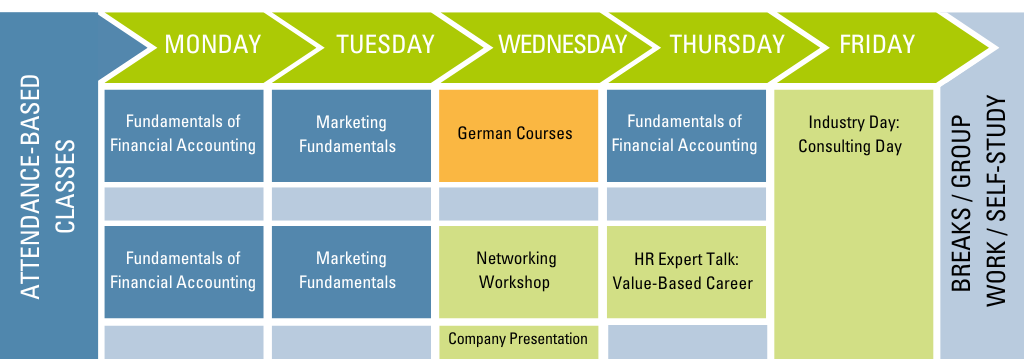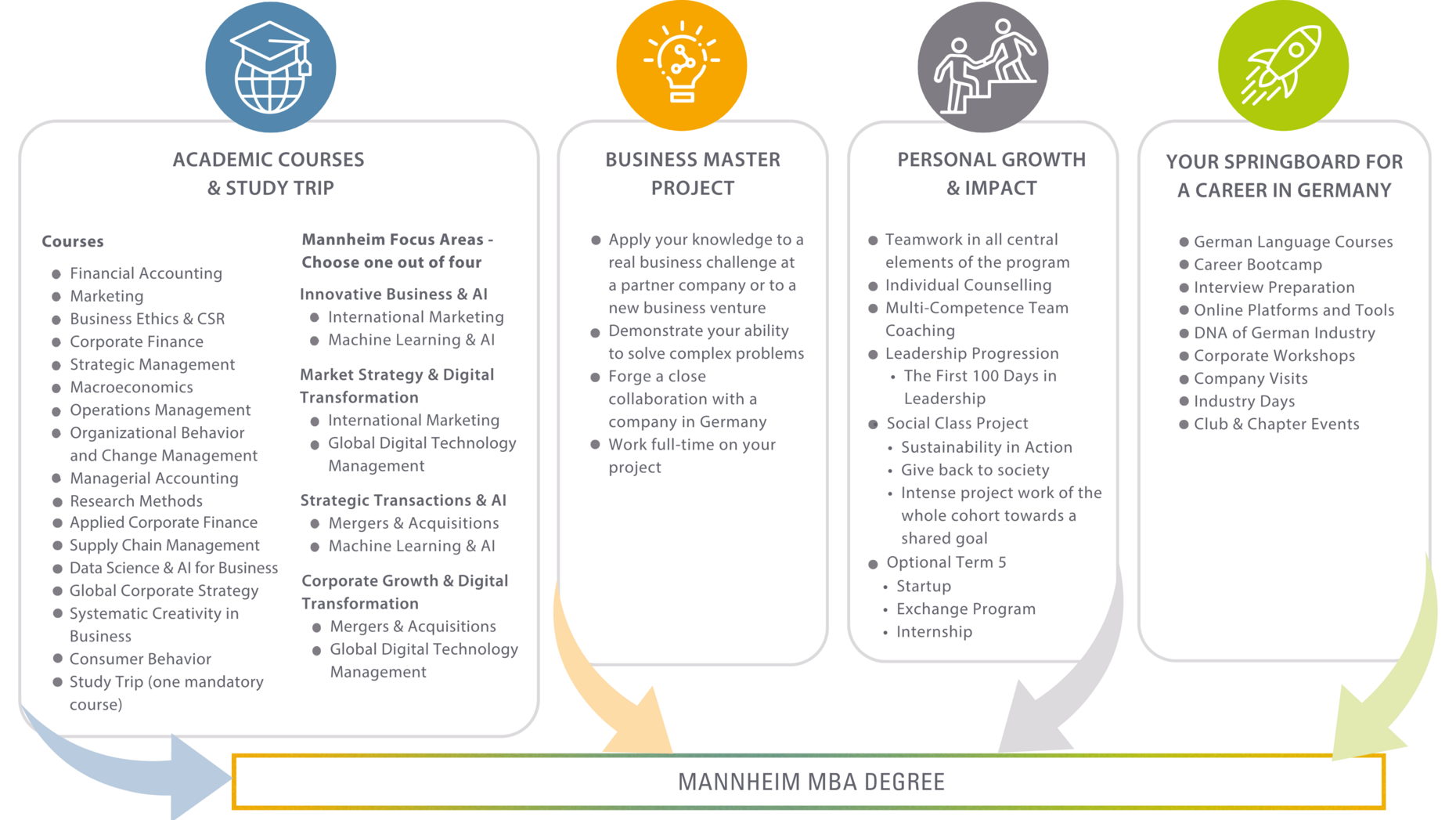Content
You are here: Programs & Courses » MBA Programs for Young Professionals » Mannheim Full-Time MBA » Content
A Sound Basis for Your Success
The Mannheim Full-Time MBA is a one-year, full-time degree program. It is an overarching, professional program that focuses on all aspects of general management, from strategy and marketing to finance and corporate social responsibility, enabling you to speak the language of accountants, HR, operations, etc.
The curriculum builds on a comprehensive range of relevant business and management theories that are firmly linked to the practical world of management, and includes a mix of case studies and inductive and deductive learning. In the course of your MBA journey, you will become a management generalist and thus be able to advance your career according to your academic, professional and personal experience, regardless of your background, be it business, engineering, IT, etc.
Perspectives
Sample Schedule of a Typical Week in Our MBA
Pivotal Elements of Your MBA Experience
Business Master Project
The Business Master Project gives you the unique opportunity to develop a solution for a complex business issue in your Multi-Competence Team, a diverse team of four to six classmates, by applying all your experience and newly gained knowledge and methodologies. You can either slip into the role of consultants and work on a business challenge being faced by a sponsoring company or develop a business plan for a completely new entrepreneurial idea. In the past, the projects involved topics such as business development and innovation, business strategy, market intelligence and change management, and in industries such as consulting, consumer products, financial services and banking, technology and telecommunications, energy and utilities, automotive, and pharmaceuticals and diagnostics.
Multi-Competence Team (MCT) coaching sessions ensure that every team member gets to contribute their views and experiences, and is treated with courtesy and respect. Working in your MCT itself will hone your intercultural, communication and leadership skills, and stimulate your ability and willingness to reflect on perspectives vastly different from your own. The very success of your MBA thesis hinges on you having a high-performance team.
Sustainability in Action
The Social Class Project is an integral part of the Mannheim MBA curriculum. You will develop, plan, organize and execute your project over the first three terms of the program, working together with your class toward a common goal. Irrespective of the nature of the project, which may be humanitarian, social, educational or ecological, you will need to directly apply your management skills. Previous classes have planted trees to combat climate change, worked with socially disadvantaged children and developed ways to reduce food waste. One class even wrote and designed a children’s book to raise children’s awareness of diversity and social cohesion.
Study Trip
The program includes a study trip to a business school located at an international business hub where you will attend a mandatory course. You will be exposed to the corporate world and the cultural richness of the respective area through guest speakers and company visits, as well as cultural activities and social events.
Flexibility: Optional Fifth Term
Participants of the Mannheim Full-Time MBA have the option to complete the program in 12 months or prolong their MBA experience by three months. During this period, they can also lay the foundation for their own company, take courses at one of our renowned partner institutions abroad, complete an internship or improve their language skills.
One Year to Power the Career of a Lifetime
Build on Mannheim’s Strengths
As part of the University of Mannheim, our history of empowering business leaders goes back more than 100 years. Our mission is to address global challenges through rigorous business research and through the education of responsible leaders dedicated to making a substantial positive impact on business and society.
Mannheim professors are recognized thought leaders. They play an active role in the international research community through top-tier publications, engagement in acknowledged academic conferences, and participation in international collaboration initiatives. Building on this academic strength, we have set up four specific Mannheim Focus Areas for you to choose from and round off your profile, each combining two core strengths of our Mannheim faculty:
- Innovative Business & AI
- Market Strategy & Digital Transformation
- Strategic Transactions & AI
- Corporate Growth & Digital Transformation
Academic courses offered are subject to change.
Academic Courses
Fundamentals of Financial Accounting
Knowledge of financial accounting is essential in understanding a company’s communication with its stakeholders (e.g., capital market investors, private lenders, regulators, etc.). However, presenting a company’s accounting information is often complex and understanding it requires some basic skills. The focus of the course is on these fundamental accounting concepts and principles, particularly how managers have to report the company’s most important economic transactions in financial statements. It will also address managerial flexibility in applying these accounting rules and ethical issues that may arise as a result of this flexibility.
Marketing Fundamentals
Marketing Fundamentals is designed to introduce participants to the key concepts, tools and practices of contemporary marketing. Effective implementation of marketing concepts requires knowledge of key relationships between internal (company) and external (competitors and customers) environments, and how they are impacted by marketing management. This course will specifically address issues pertaining to marketing strategy, innovation management, branding, pricing, sales management, CRM and communication decisions.
Business Ethics and Corporate Social Responsibility
This course provides participants with an overview of the concepts and theories related to corporate social responsibility (CSR) and managerial discretion at an individual level. Competing positions will be juxtaposed and discussed in an interactive course format. Participants will form groups to work on real-world managerial problems pertaining to CSR and subsequently present their findings.
Fundamentals of Corporate Finance
The purpose of this course is to provide participants with an introduction to the major financial decisions companies are faced with and the methods and tools they use to solve these problems. The topics covered include capital budgeting, financial statement analysis, valuation of securities, working capital management as well as financing and capital structure decisions.
Fundamentals of Strategic Management
How companies manage to gain a competitive advantage and thus superior financial performance relative to the industry is the issue at the heart of strategic management research. The course discusses the various building blocks that may help a company generate a competitive advantage, such as the company’s competitive positioning, resource and capability base, etc. The course also familiarizes you with various tools, concepts and analytical frameworks that are meant to enhance your ability to define and analyze strategic problems and identify sources of competitive advantage from both an industry and a company perspective.
Macroeconomics
The main objective of this course is to acquaint students with the challenges of economic globalization. Applying basic economic theories, it will demonstrate that, on average, an increase in international economic integration will lead to an overall increase in economic welfare, although not everyone stands to gain from this. The analysis will also show that with a country’s increased openness, its national economic policies become less efficient. Consequently, international economic policy coordination is the appropriate answer to economic globalization.
Operations Management
Operations management develops management, analytics and engineering approaches for the effective planning of resources and activities from the strategic level down to the control level. It focuses on systematic capacity planning and operations planning of supply chain activities and production processes in manufacturing and service systems to match supply and demand.
Organizational Behavior and Change Management
Organizational Behavior and Change Management is designed to familiarize MBA participants with the behavioral aspects of business administration. Issues related to behavior in organizations will be addressed to help MBA participants reflect upon their own work experiences and analyze them using applied psychological and sociological frameworks. The course will first focus on individual processes in organizations, particularly on personality, motivation and achievement orientation. It will then proceed to group dynamics and team performance, and finally end with an examination of organizational issues, focusing on organizational culture. Leadership issues including how to lead a team and how to lead in a larger unit such as a department. Common leadership mistakes that should be avoided will be also highlighted. The last part of this course will focus on change management, discussing a step-by-step process for introducing change, communicating change and finally, dealing with resistance to change.
Managerial Accounting
An organization’s long-term competitive success is critically dependent on the availability and efficient use of information about its products, services, processes, organizational units, suppliers and customers. Managerial accounting includes the concepts, models and systems that provide the information and use the gained insights for internal control. The course will familiarize participants with the terminology and basic concepts of managerial accounting, touching on topics ranging from development and use of cost information for decision-making, all the way to performance measurement and financial planning. The design and use of internal reporting systems varies substantially across different companies and industries. To shed light on the various practices, the course integrates a number of real-world cases accompanied by interviews with managers. Applications include both the manufacturing and the service sectors.
Qualitative and Quantitative Research Methods
Qualitative and Quantitative Research Methods is designed to introduce participants to the key concepts and methods of empirical business research. Companies and managers can rely on various sources of “small” and “big” data, and methods to obtain a better empirical basis for their decision-making or even for the automation of key business processes. Participants will acquire a profound knowledge of how to evaluate the overall quality of empirical studies conducted by internal or external experts (e.g., market research companies, business intelligence departments, etc.). Participants will also critically discuss these issues in the light of “big” data. They will learn how to design an empirical study that best addresses a particular research problem. This course will discuss key qualitative and quantitative methods that can be used to analyze market, company or customer data from multiple sources, as well as the strengths and weaknesses of these methods and sources of data. Participants will apply this knowledge and address specific business research problems on their own.
Applied Corporate Finance
This course is designed to provide students with an opportunity to apply and extend the concepts and tools they have learned in other courses, e.g. Fundamentals of Financial Accounting, Corporate Finance, etc. It will focus on the creation of shareholder value and cover topics including financial analysis, company valuation, the cost of capital, mergers and acquisitions, leveraged buyouts, capital structure decisions and initial equity offerings.
Supply Chain Management
Supply chain management (SCM) is responsible for designing and operating globally dispersed operations with highly interrelated processes in procurement, manufacturing and logistics. SCM has a substantial impact on companies’ profitability in terms of costs and revenues, and is crucial in securing companies’ long-term sustainability. Managerial decisions in SCM concern a company’s global footprint in procurement, manufacturing and distribution, the implementation of appropriate organizational structures and processes, and the use of information systems and technology.
The course is structured around these important managerial tasks. It will not only introduce participants to state-of-the-art concepts and technologies for implementing highly effective global supply chains, but will also provide insights into how recent technological developments (e.g. in SCM software and machine learning) may shape the future of SCM. It will focus mainly on three interrelated topics: global supply chain design and strategy, the impact of new technologies and tools, and the (re)design of the supply chain organization.
Data Science & AI for Business
The course “Data Science & AI for Business” equips business professionals with the skills to apply AI and data science for smarter, faster decision-making. Participants will explore real-world applications of machine learning, big data, and analytics to drive business value, build data-driven strategies, and unlock new growth opportunities. Learn how to lead digital transformation and turn data into a strategic and competitive advantage.
Designed for professionals ready to lead in the digital age, this course explores cutting-edge applications of AI, machine learning, and data analytics in real-world business contexts. Participants will learn how to build data-driven cultures, craft actionable AI and data strategies, and unlock new revenue opportunities through AI- and data-powered innovation.
Global Corporate Strategy
Global strategy is about formulating a link between a company’s vision, mission, objectives and actions, and implementing the actions to gain a competitive advantage over its competitors. When this happens between HQ and the subsidiaries of global companies, it becomes a complex exercise for corporates. Thus, the corporation needs to assess the global and domestic environments in which it operates, take the industry dynamics into consideration, find the resources it needs and develop its competences. Some of these competences can then be converted into winning capabilities that will not only focus on customer needs but also evaluate competition and make choices. Any choice involves risk, especially in constantly changing national and international environments.
To mitigate the risks associated with global business, the discussion about global strategy includes any problem or opportunity that arises in the areas of finance, production, marketing, information technology and human resource management. The course draws on the external and internal environment, the company’s macro- and microeconomics, and the exogenous and endogenous variables that are the drivers of the strategy-making process. Consequently, this course is both interdisciplinary and integrative.
Systematic Creativity in Business
This course is designed to teach students a number of systematic creative problem-solving methods that complement other managerial tools acquired in undergraduate and graduate programs. These methodologies come into play when a decision has been made to search for a creative solution. Participants learn how to solve problems, identify opportunities and come up with those elusive ideas that could generate value for organizations with just a small investment. The course will focus on new product ideation and creative marketing actions, and also touch upon communication and dilemma resolution.
Consumer Behavior
Successful companies put customers at the center of their marketing strategies. From uncovering consumer desires and preferences to ensuring customer satisfaction, understanding the consumer journey is essential for marketing excellence. This course explores consumer behavior and decision-making processes, emphasizing how psychological factors—such as perception, motivation, attitudes, beliefs, and learning—shape consumer choices. By examining the complexities and inherent irrationalities of human behavior, students will gain actionable insights to craft compelling marketing strategies in advertising, branding, pricing, and promotions. Ultimately, this course equips students with the knowledge to anticipate consumer needs and effectively engage target audiences in today's dynamic market.
International Marketing
This course is designed to develop participants’ skills in creating, implementing and evaluating marketing strategies and programs in an international context. The basis of a successful international marketing program is a sound understanding of the principles of marketing. This course will build on this understanding and seek to broaden the participant’s skill set by emphasizing its application in an international environment. It focuses on the role of emerging markets in shaping the global competitive landscape.
AI and Machine Learning Fundamentals
The rise of artificial intelligence (AI) and machine learning is disrupting how companies do business. This introductory course will provide the essentials of a broad spectrum of machine learning methods and insights into diverse real-world applications as well as ethical considerations of AI applications. In addition, it will cover recent trends in AI leveraging unstructured data such as images, text, voice and video.
Global Digital Technology Management
The objective of this course is to provide MBA students with a substantial overview of key topics in global digital technology management (GTDM) with a focus more on strategic and tactical issues than on operational and technological ones. Subsequently, participants should be able to initiate and lead strategic digital initiatives, evaluate the role of technology in digital transformation, understand the relevance and responsibilities of the Chief Digital Officer and the Chief Information Officer, and incorporate external sources of digital technology. They should also be able to independently prepare, analyze and decide on digital initiatives in all these areas.
Mergers and Acquisitions
For decades, mergers and acquisitions have consistently been the primary vehicle for reshaping companies’ business portfolios. However, both the rationale and the economic outcomes of mergers and acquisitions have remained a source of controversy in academia and business practice. The purpose of this course is to unpack which of the “received wisdom” on mergers and acquisitions really holds up to rigorous scrutiny and which does not. To serve this purpose, the key determinants of acquisitions and the deal-making process will be systematically reviewed and the economic outcomes of acquisitions coupled with the key contingencies influencing acquisition outcomes discussed. Moreover, some of the key tools for analyzing and completing acquisitions will be discussed and applied.
Quick Links
Contact Person

















